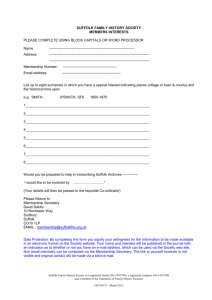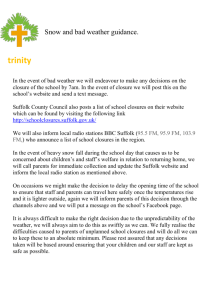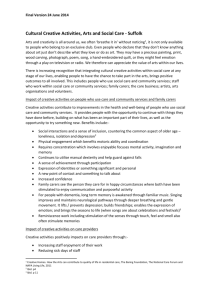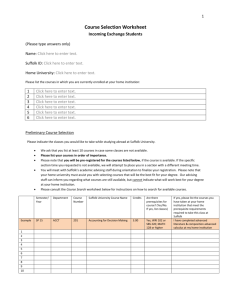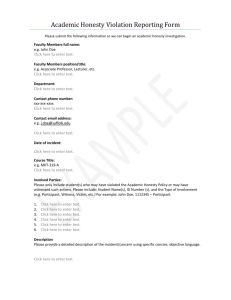Mystery Task - Our Kind of People
advertisement
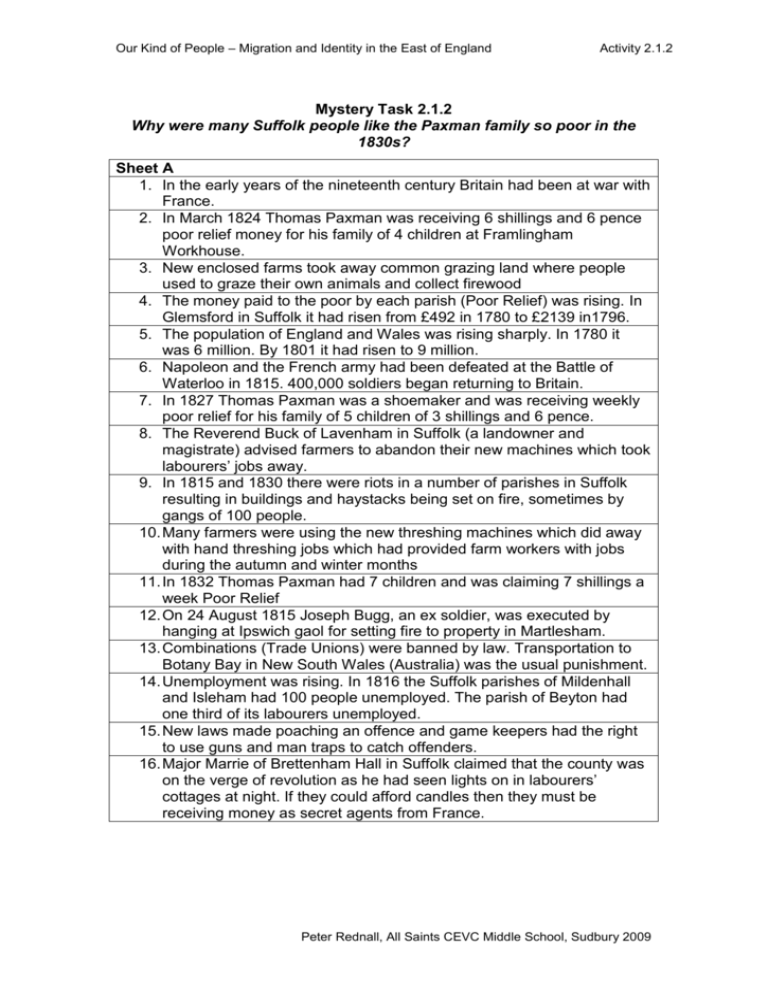
Our Kind of People – Migration and Identity in the East of England Activity 2.1.2 Mystery Task 2.1.2 Why were many Suffolk people like the Paxman family so poor in the 1830s? Sheet A 1. In the early years of the nineteenth century Britain had been at war with France. 2. In March 1824 Thomas Paxman was receiving 6 shillings and 6 pence poor relief money for his family of 4 children at Framlingham Workhouse. 3. New enclosed farms took away common grazing land where people used to graze their own animals and collect firewood 4. The money paid to the poor by each parish (Poor Relief) was rising. In Glemsford in Suffolk it had risen from £492 in 1780 to £2139 in1796. 5. The population of England and Wales was rising sharply. In 1780 it was 6 million. By 1801 it had risen to 9 million. 6. Napoleon and the French army had been defeated at the Battle of Waterloo in 1815. 400,000 soldiers began returning to Britain. 7. In 1827 Thomas Paxman was a shoemaker and was receiving weekly poor relief for his family of 5 children of 3 shillings and 6 pence. 8. The Reverend Buck of Lavenham in Suffolk (a landowner and magistrate) advised farmers to abandon their new machines which took labourers’ jobs away. 9. In 1815 and 1830 there were riots in a number of parishes in Suffolk resulting in buildings and haystacks being set on fire, sometimes by gangs of 100 people. 10. Many farmers were using the new threshing machines which did away with hand threshing jobs which had provided farm workers with jobs during the autumn and winter months 11. In 1832 Thomas Paxman had 7 children and was claiming 7 shillings a week Poor Relief 12. On 24 August 1815 Joseph Bugg, an ex soldier, was executed by hanging at Ipswich gaol for setting fire to property in Martlesham. 13. Combinations (Trade Unions) were banned by law. Transportation to Botany Bay in New South Wales (Australia) was the usual punishment. 14. Unemployment was rising. In 1816 the Suffolk parishes of Mildenhall and Isleham had 100 people unemployed. The parish of Beyton had one third of its labourers unemployed. 15. New laws made poaching an offence and game keepers had the right to use guns and man traps to catch offenders. 16. Major Marrie of Brettenham Hall in Suffolk claimed that the county was on the verge of revolution as he had seen lights on in labourers’ cottages at night. If they could afford candles then they must be receiving money as secret agents from France. Peter Rednall, All Saints CEVC Middle School, Sudbury 2009 Our Kind of People – Migration and Identity in the East of England Activity 2.1.2 Mystery Task 2.1.2 Why were many Suffolk people like the Paxman family so poor in the 1830s? Sheet B 1. After 1815 400,000 soldiers returned to Britain after fighting the French. They were looking for work. 2. In March 1824 Thomas Paxman was receiving 6 shillings and six pence (32 pence) Poor Relief money for his family of 4 children from Framlingham Workhouse. 3. Many poorer people could no longer graze their animals on common land as rich farmers were now creating their own fields. 4. Money paid to the poor was going up. At Glemsford in West Suffolk it had risen from £492 in 1780 to £2139 in 1796. 5. In 1827 Thomas Paxman, a shoe maker, was receiving weekly Poor Relief for his family of 5 children of 3 shillings and sixpence (17 pence). 6. In 1815 and 1830 many unemployed farm workers showed their anger by attacking farm machines and burning farm property. Sometimes there were more than 100 people in a gang. 7. From the 1750s farmers began using new machines and methods which didn’t need so many workers. 8. In 1832 Thomas Paxman had 7 children and was receiving 7 shillings (35 pence) Poor Relief money a week. 9. Workers, in the early 1800s, were not allowed to join unions (combinations) to protect their rights. Punishment for belonging to a union could result in transportation to Botany Bay in New South Wales (Australia). 10. Unemployment in Suffolk was rising. In 1816 Mildenhall had 100 people unemployed. Beyton had one third of its workers unemployed. 11. For centuries people had been poaching animals and birds for food. New laws made this an offence and gamekeepers carried guns and set man traps to catch poachers. 12. The Reverend Buck, vicar of Lavenham, asked farmers to get rid of their new machines and create more farm jobs for unemployed labourers. 13. On 24 August 1816 Joseph Bugg, an ex soldier, was executed at Ipswich gaol for setting fire to property in Martlesham. Cut out the ‘cards’ above and sort them into 4 piles: Those which tell you what was happening to the Paxman family. Those which tell you why so many people were unemployed. Those which tell you why people were so angry and what they were doing to express their anger. Those which tell you what the authorities did. This could also be done using cut and paste and creating a table on a computer. Students print out the results of their final sorting. Peter Rednall, All Saints CEVC Middle School, Sudbury 2009 Our Kind of People – Migration and Identity in the East of England Activity 2.1.2 Now write a short essay of four paragraphs putting these together to answer the question. Why were so many Suffolk people like the Paxman family so poor in the 1830s? The Paxman family lived in the small Suffolk town of Framlingham. During the 1820s and 1830s they were very poor. The evidence for this tells us…………. During the first half of the 19th century many other Suffolk and East Anglian people were also suffering severe hardship. There were a number of reasons for this………… It was difficult for people to do anything to improve their lives……….. The authorities reacted by….. Peter Rednall, All Saints CEVC Middle School, Sudbury 2009
